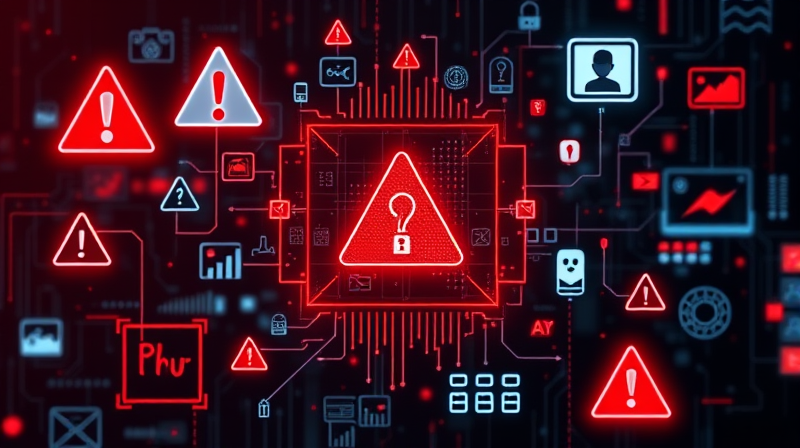In today’s digital era, where technology intertwines with every facet of our lives, protecting your personal information and finances is more important than ever. With cybercriminals refining their tactics by leveraging artificial intelligence, sophisticated social engineering, and deepfake technologies, it is crucial to arm yourself with the knowledge to identify online scams. This article is designed to inspire vigilance and guide you through recognizing the red flags that separate genuine communications from deceitful manipulations.
The digital landscape is constantly evolving. As scammers become more adept at impersonating trustworthy sources, one must look deeper than the surface. By learning how to spot early indicators of scams, you not only protect your data but also empower your friends and family to stay safe online.
The Rise of AI-Powered Scams and Imposter Cons
Artificial intelligence has revolutionized many sectors, yet it has also enabled new methods for criminals. In this realm, generative AI is used to produce fake profiles, create deepfake video calls, and send automated messages that appear legitimate at first glance.
Imagine receiving a seemingly spontaneous text message, like an apology for running late. Such messages can be the opening gambit to a larger scheme aimed at extracting sensitive information or financial resources. Criminals may also pose as benevolent third parties, especially in sensitive contexts such as finance or tax preparation. By offering unsolicited help in setting up accounts, these imposters aim to capture personal credentials under the guise of assistance.
These scams remind us that while technology brings convenience, it also demands caution. Even interactions that begin innocently can soon spiral into dangerous territory. A key strategy is to always verify the identity of anyone requesting personal or financial information.
Phishing Emails and Navigation Through Suspicious Links
Phishing remains one of the most ubiquitous scams in the digital sphere. Emails coming from well-known companies may urge immediate action with phrases such as "Update your account now!" but behind these seemingly urgent requests lie hidden threats.
Keep an eye out for specific red flags in every email you receive:
- Unfamiliar sender addresses: Always hover over links and double-check URLs to ensure they lead to the legitimate site.
- Generic greetings and poor grammar: A reputable company typically addresses you by name and adheres to professional communication standards.
- Suspicious attachments: Unknown files or links should not be clicked without careful verification.
Awareness is key when facing phishing scams. Even if the message appears critical, pause to analyze the structure of the email, the sender's identity, and the context before clicking any links or providing information.
romance, Job, and Relationship Scams: Navigating Trust and Caution
Not all scams target your bank account directly. Some predators prey on your vulnerability by exploiting your desire for connection, especially on social media and dating applications. What starts as a friendly conversation can quickly evolve into a scam where trust is manipulated into financial gain.
Scammers can use a range of tactics, from feigning interest in a relationship to proposing unbelievable job opportunities. Social interactions become the canvas on which they paint their deceitful narratives.
This is not limited to romance. Employment scams, for example, often begin with enthusiastic job offers that arrive unexpectedly. They might involve rushed interview requests or offer positions that require upfront payments or submission of personal documents. Such red flags should immediately prompt further scrutiny.
By learning to recognize these cues, you can save yourself the distress and financial loss associated with falling victim to these schemes. In every case, take a step back and ask for additional verification before committing to any agreement.
Social Media, Misinformation, and E-Commerce: Modern Challenges
The spread of false information is not limited to personal communications. Social media channels have become fertile ground for scams involving fake financial or tax advice. Influencers or even seemingly credible sources might circulate tips that, upon closer inspection, can be misleading at best or actively harmful at worst.
Always verify any advice with trusted sources and cross-check information with official websites or established experts before acting on it. Whether it concerns tax filings, investments, or other financially consequential decisions, caution is paramount.
E-commerce is another critical area where scams manifest. Both consumers and merchants can fall prey to fraudulent activities. For instance, orders that seem too large or suspicious payment methods, like gift cards or cryptocurrency, may indicate an underlying fraudulent intention.
Recognizing the signs early can prevent not only financial losses but also broader damages to your digital reputation. Maintain vigilance on all platforms and trust your instincts when a deal or interaction seems off.
Proactive Prevention and Community Awareness are your best defense against the evolving strategies of cybercriminals. Regularly educate yourself on new scam tactics and share this knowledge within your community. By doing so, you create a network of awareness and resilience against deceptive practices.
Moreover, always report suspicious activities to the appropriate authorities or platforms. By alerting others, you contribute to a safer digital environment for everyone.
In conclusion, recognizing the red flags of online scams is essential in navigating the increasingly complex world of digital communication and commerce. With an informed and critical eye, you can discern between legitimate interactions and those that bear the hallmarks of deception. Stay alert, educate those around you, and implement cautious measures to secure your personal and financial information in the vast digital landscape.
Your alertness is a catalyst for change. When you choose to educate yourself and others about the dangers of online scams, you not only protect your own assets but also contribute to a collective shield against cybercrime.








